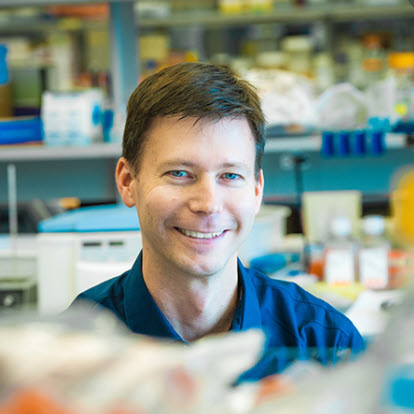Type 1 Diabetes (T1D), once known as insulin dependent diabetes, is a chronic condition that causes pancreatic cells to produce little or no insulin. Insulin plays an important role in regulating blood sugar, or glucose, so T1D patients cannot naturally regulate their blood sugar levels.
Current treatments for diabetes are costly with diabetes-related healthcare costs in Canada expected to increase to over $16.9 billion by 2020. They carry costs for patients as well, frequently in the form of negative side effects. One conventional method of treating T1D is the daily administration of insulin to manage blood sugar levels. This treatment is different from the control of a pancreatic cell, meaning patients are more likely to experience the debilitating consequences of improper glucose management. These can include damage to the eyes, nerves, kidneys, heart, and later life health complications.
To regain the benefits of working pancreatic cells, a more elegant approach is to simply replace those cells by transplanting insulin-producing pancreatic tissue into a T1D patient. However, this is not a viable long-term solution. A finite supply of donor working pancreatic tissue available to transplant, coupled with the requirement for the patient to administer life-long anti-rejection drugs that can themselves lead to significant health complications, means that an alternative is needed. An ideal solution is treating T1D with insulin made by pancreatic cells in the patient’s own body, like a transplant – but in a way that hides those cells from the patient’s immune system so anti-rejection drugs are not needed.
In a collaborative project with Dr. Timothy Kieffer of the University of British Columbia (UBC), Vancouver-based company Aspect Biosystems is producing a bioprinted therapeutic of pancreatic cells surrounded by a protective layer that can be implanted in T1D patients. This bioprinted therapeutic will contain genetically modified stem-cell derived pancreatic cells that will take over the production of insulin and thereby regulate blood sugar levels naturally. This could serve as an effective and scalable therapy for individuals with T1D, allowing them to move away from both daily insulin injections and long-term treatment with anti-rejection drugs.
“This generous and strategic support from Genome BC allows us to strengthen our existing collaboration with Dr. Kieffer, a world leader in the development of stem cell-derived pancreatic beta cells for clinical use,” said Dr. Sam Wadsworth, Chief Scientific Officer, Aspect Biosystems. “By working together, we look forward to developing a bioprinted pancreatic therapeutic that could significantly improve the quality of life for millions of people globally.”
This collaboration, supported through Genome BC’s GeneSolve program, represents a novel technological and genomics-based approach that will circumvent the shortcomings of existing methods. “This therapeutic design thoughtfully addresses the risks that current treatments pose to patients and incorporates genomics tools to test the system and make it safer,” says Dr. Pascal Spothelfer, President and CEO, Genome BC. “It could represent a big step forward for patients and for the healthcare system.”
This press release originally appeared on the Genome BC website.
